Have you ever wondered what it would be like to GROW LEMON CUCUMBERS? It’s a UNIQUE EXPERIENCE with its own set of CHALLENGES.
The whole process of growing lemon cucumbers can be both exciting and daunting. However, don’t worry. We’ve got you covered. After all, who said you couldn’t have fun while doing it?
Growing these delicious fruit vegetables is actually an art form! Lucky for you, WE ARE EXPERTS in the art of gardening. We HAVE GROWN lemon cucumbers in our gardens for many years. They never fail to make us smile when they start growing.
TRUST US. You will have no shortage of sour yet sweet lemon-flavored cucumbers in your garden! All you need to do is follow our advice.
We’ll explore the NUTRITIONAL VALUE of lemon cucumbers. Then, we’ll tell you the BEST-GROWING CONDITIONS for them.
Next, we’ll show you HOW TO PLANT AND HARVEST THEM PROPERLY, and finally, what you can do with them.
Keep reading to learn all about this delicious vegetable!
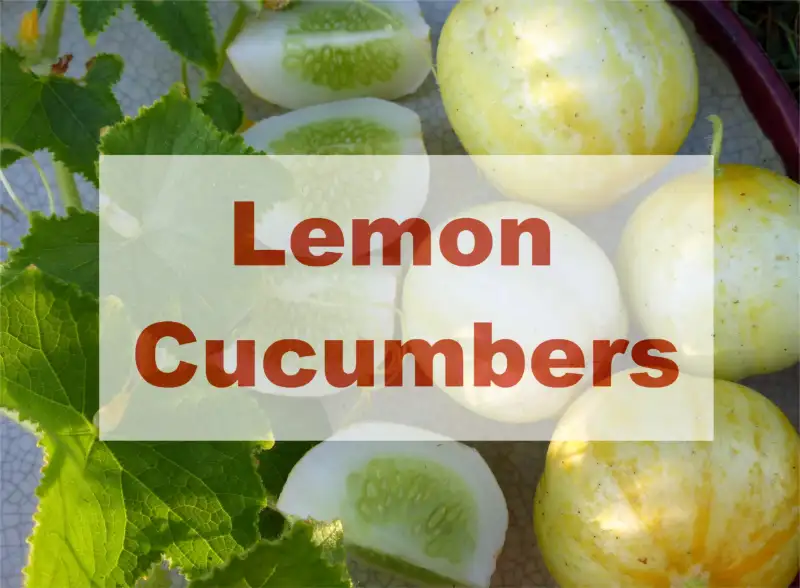
All About Lemon Cucumber
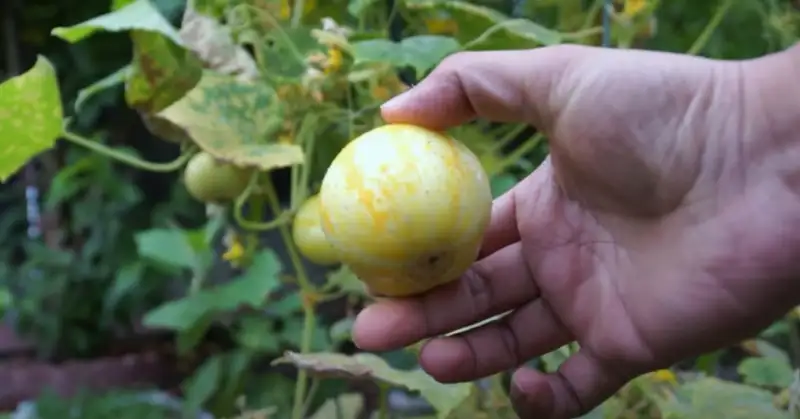
Lemon cucumbers, also known as Lemon Cukes, are the QUEEN OF CUCUMBERS! They are a type of cucumber variety known for their UNIQUE taste and BRIGHT YELLOW COLOR. Traditional green cucumbers are still the norm.
But lemon cucumbers have been gaining in popularity. This is due to their fruits’ distinct flavor and vibrant color.
When growing the lemon cucumber plant, it generally prefers COOLER CLIMATES. They can be started from either seeds or seedlings. Once planted, you’ll need to pick your lemon cukes when they are ripe.
Otherwise, you’ll end up with sour lemon cucumbers that taste like a lemon and a cucumber argued! Hahaha.
MOST CLIMATES can support lemon cucumbers – so why not try them? They look great when used as garnish or decoration. They also add an interesting twist of flavor to many dishes.
Plus, with proper care, you maximize fruit production; what’s not to like? So go ahead and let your inner gardener out – you won’t regret it!
Nutritional Value of Lemon Cucumber
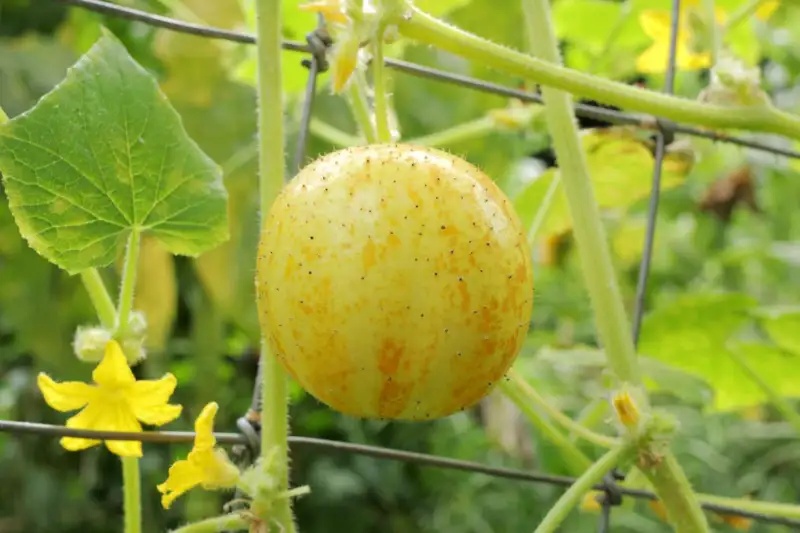
These fruits are packed with NUTRITIONAL VALUE! Here are just a few:
- Ripe lemon cucumbers contain VITAMINS A, B, and C. One lemon cucumber is said to have more vitamin C than four lemons!
- They also have high calcium, phosphorus, iron, and magnesium levels.
- The lemon cucumber plant is full of DIETARY FIBER. This helps digestion and keeps you feeling fuller for longer. You’ll be sure not to feel like an overstuffed lemon cucumber afterward!
- Eating ripe lemon cucumbers is a great way to get your daily dose of potassium. It helps maintain HEALTHY BLOOD PRESSURE. Doctors call it the “Lemon Cucumber Cholesterol Buster”!
- Lemon cucumbers can be used in salads, sandwiches, or just eaten raw – they’re delicious either way!
- Did you know that the skin of a lemon cucumber is edible? It’s full of ANTIOXIDANTS, and other nutrients, so don’t throw it away!
Even if you’re not a fruit lover, lemon cucumbers are worth trying. – they could become your new favorite snack or side dish! Have you ever tried one? What did you think? Not yet?! Go ahead and tell us what you think!
Growing Conditions of Lemon Cucumber
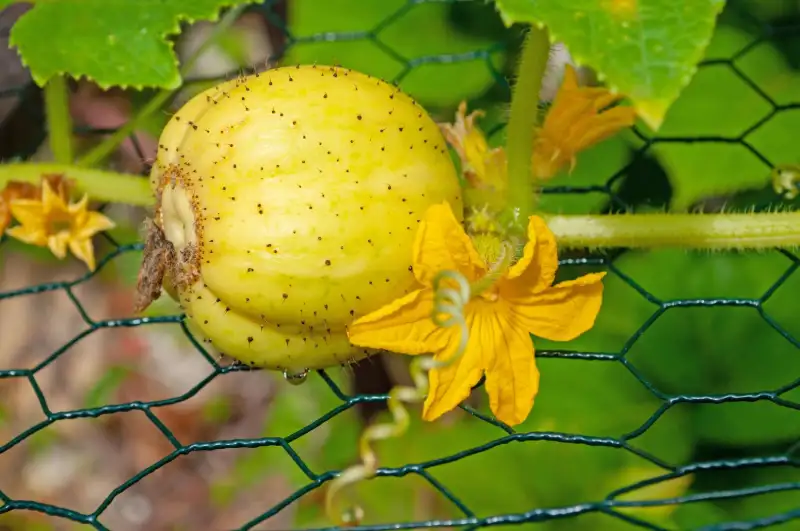
Growing lemon cucumber plants can be a fun and rewarding experience – that is, if you know how to do it right! Here are some tips for keeping them healthy and happy:
1. Good Soil And Sunlight
Give them full sun, well-drained soil, and evenly moist soil for optimal conditions. Plant your seeds in an EXPOSED GARDEN space or a RAISED BED about two feet apart to achieve this.
2. Water
Water them regularly so that they stay in the soil evenly moist but not soggy! Just remember the old saying if you’re worried about getting the ground too wet. They say, “If life gives you lemons…and cucumbers…DON’T DROWN your plants!”
3. Manure
Your lemon cucumbers need some compost or WELL-ROTTED manure mixed into the ground. Think of it like providing your plants with the food they need. Also, sometimes add fertilizer.
It provides enough NUTRIENTS for their roots and leaves to develop well. ORGANIC FERTILIZERS work best (for both you AND the environment)!
After all, they will feed you, so why not take care of them?
4. Supporting Insects
Beneficial insects can help keep away pests like APHIDS. Such pests may damage the lemon cucumber plant. So try to use MINI GREENHOUSES during the growing season. This is often from late summer until the frost season arrives.
5. Careful Transplanting
Transplant shock must be avoided as it can damage your young plants. You give them less heat than other plants when they’re first TRANSPLANTED. No one likes going from comfortable indoors to sweltering outdoors without warning!
6. Good Temperatures
Keep the soil temperature between 65-75 degrees Fahrenheit. This will help promote the optimal growth of your lemon cucumbers. Otherwise, your cukes may become grumpy (or worse yet – sour!).
Step-by-Step Guide for Planting Lemon Cucumbers
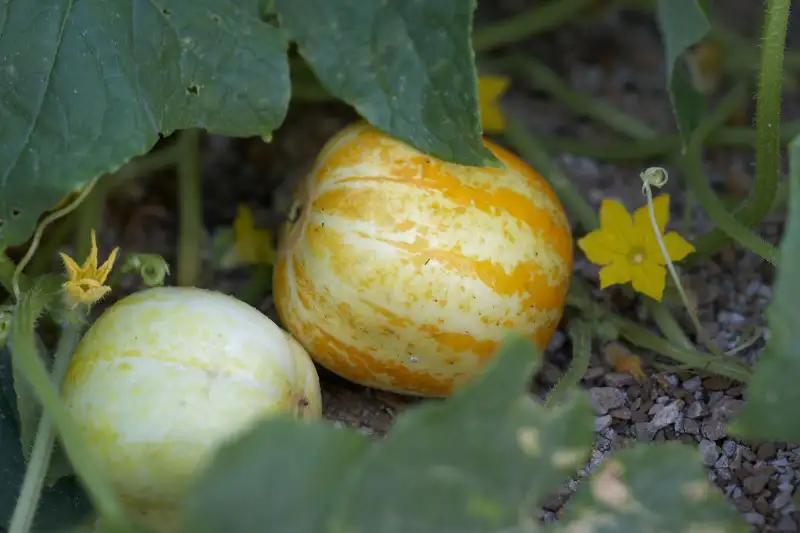
Are you planning on growing lemon cucumbers this season? Here’s a simple step-by-step guide on planting lemon cucumbers:
1. Source your seeds
Start by getting your lemon cucumber seeds directly from a RELIABLE SOURCE. Get the cucumber varieties that complement your garden space and soil composition best.
2. Give the sun
Choose a sunny spot in your garden, as lemon cucumbers require FULL SUNLIGHT to thrive. Spread the seeds evenly over the chosen area and cover them with soil. Think of it like baking many small cakes.
It would help if you found the perfect spot in the oven, then spread your tiny dough evenly. And then cover your pastries with some topping!
3. Space them
Plant the seeds directly into seed trays or pots. It will allow ENOUGH SPACE for each of the plants to begin growing. So, no cramped conditions here! Make your SOIL EVENLY MOIST at all times; this is crucial for successful seed germination!
4. Transplant them
Note when the lemon cucumber plants have grown strong enough. It’s time to TRANSPLANT them into your garden space. Before doing so, add compost to enrich and nourish the soil. It also prevents other diseases, such as POWDERY MILDEW, from taking hold of your plants.
5. Water and feed them
Once planted in the ground, ensure they get plenty of SUN EXPOSURE. Also, water their roots regularly. But don’t overdo it! You should also add fertilizer EVERY FEW WEEKS. It will ensure healthy growing plants full of flavor!
Think of it like raising a child: give them plenty of sun and water, but don’t drown them! Give them occasional food (fertilizer) to keep them healthy and growing.
6. Harvest them
Finally, monitor your lemon cucumber seeds closely. They might surprise you one day by having grown bigger than expected overnight! Hahaha. Harvest when they reach MATURITY. This will be approximately 50-60 days – depending on which cucumber varieties you have!
Lemon Cucumber Harvesting
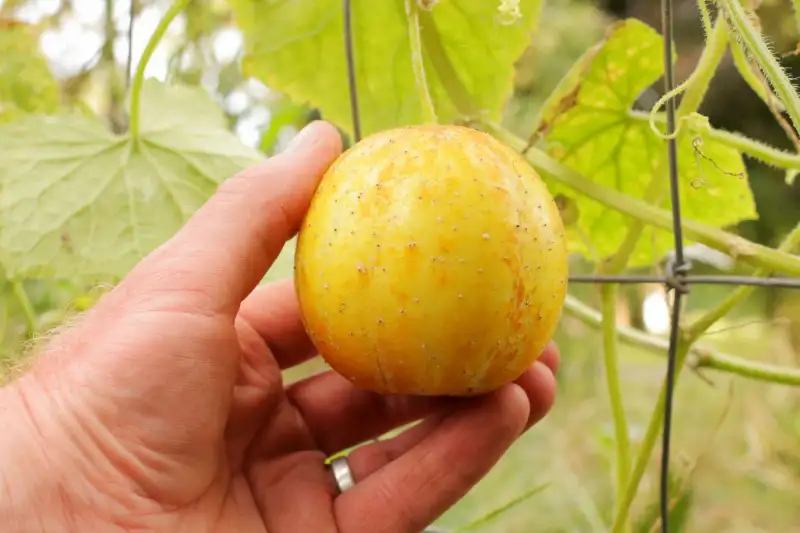
Harvesting lemon cucumbers requires patience, preparation, and knowledge of the plant. Remember the art form part from earlier? Here’s a brief guide to help with your harvest:
- When the plants BEGIN TO FLOWER, you’ll know that harvest time is near! Usually, lemon cucumber plants take AROUND 60 DAYS to reach maturity, so mark it in your calendar. It is not all that long – unless you count in dog years. Then it’s probably way longer!
- Look for yellow flowers and then check the size of the cucumbers. They’re usually ready when they are TWO OR THREE INCHES long. Think of them like ground lemons!
- Take extra care when harvesting them from a garden bed. Don’t pull TOO HARD on the plant, as this can damage it and other nearby plants. It might yell and give you a heart attack!
- The best way to tell if the cucumbers are ripe is by their color. A pale yellow hue indicates that they’re ready for picking! Not too mature or sour like a lemon, just perfect enough for a summer salad.
Caring for Lemon Cucumbers
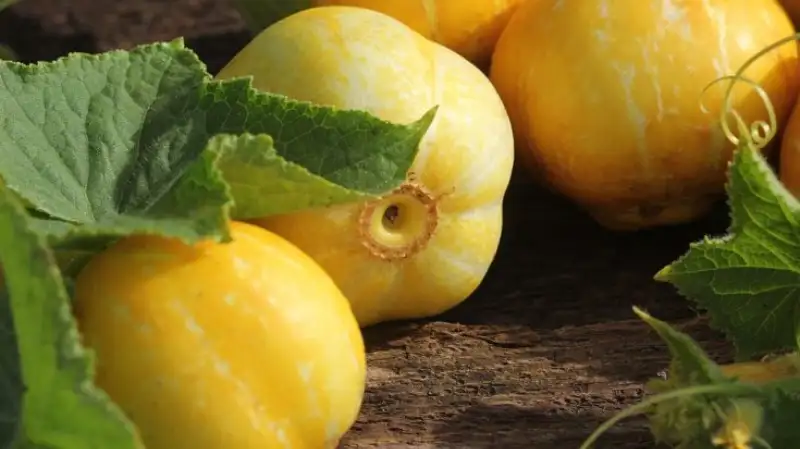
- Your lemon cucumber plants or seedlings need the full sun to get started.
- You should also consider spacing them 6-12 inches apart. Make sure the plants are surrounded by WELL-DRAINED SOIL. You are not growing water lilies after all! Hahaha
- Make sure to add compost to enrich the soil while planting. Keep the soil evenly moist and add fertilizer every two weeks to ensure fruit production. Otherwise, they’ll grow just for show – a sad show of malnourished plants!
- When your plants are ready, start harvesting!
- Pick off any pests on the fruits or leaves as soon as you see them, as they can cause DAMAGE IF LEFT UNCHECKED.
- Also, keep an eye out for POWDERY MILDEW. It is a common problem with cucumbers—and treat it immediately if spotted, as it can ruin your crop. Think of it like a cold; you want to catch and treat the symptoms early before they can spread and become worse.
- Finally, enjoy some beautiful lemon cucumber flowers in your garden (or in a vase!) for those final touches of beauty before snacking on some delicious homegrown fruit! What could make summertime more magical than that?
What Can You Do With Lemon Cucumber?
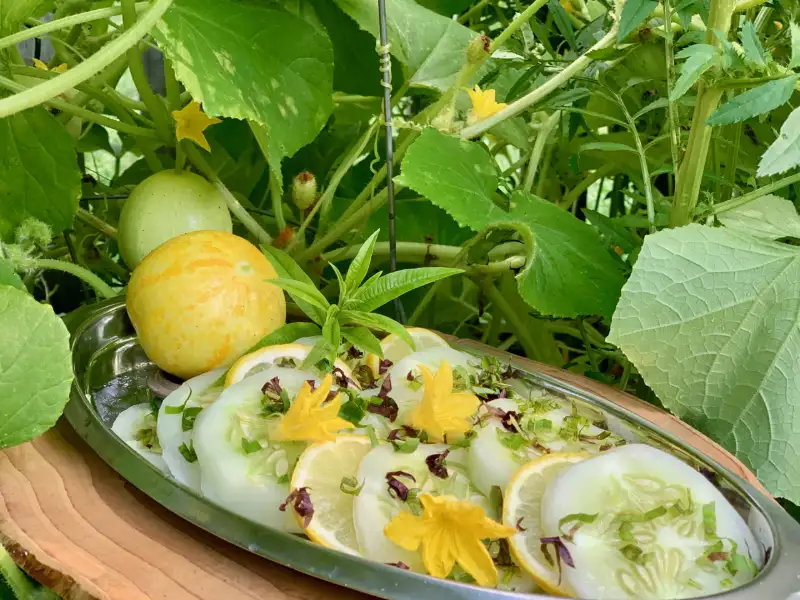
Do you want to get adventurous in the kitchen? Lemon cucumbers are a perfect choice. They feature a DISTINCT TASTE and provide a vibrant yellow color to any meal.
Want to spice things up? Incorporate herbs and spices like cumin or coriander and lemon cucumber. Or mix them into some HOMEMADE HUMMUS for a pleasant citrus flavor. Though it is not as pungent as when you accidentally add too much garlic!
For a HEALTHY SNACK on the go, simply slice up some of these veggies and enjoy! Remember that with these unique vegetables, the possibilities are truly endless. Try them out today for an unforgettable culinary experience!
FAQs about Lemon Cucumbers
1. Do lemon cucumbers taste different?
Yes, lemon cucumbers have a distinct flavor, unlike other types of cucumbers. They are sweeter and lack the same level of acidity as regular cucumbers. You can also detect a slight hint of citrus in their taste.
Lemon cucumbers tend to be crunchier and juicier than other varieties too. This makes them the perfect addition for salads or simply enjoyed as a snack!
2. Should you peel lemon cucumbers?
Yes, you should peel lemon cucumbers. Lemon cucumbers have soft skin with small bumps and ridges that are edible. However, removing the skin before eating is best as it can be bitter. Doing so will also make the cucumber easier to slice or dice for salads or other recipes.
Otherwise, you can keep the skin if you are going for that bitter taste in your recipe.
3. Do lemon cucumbers come back every year?
Lemon cucumbers are a type of yearly vegetable that sprouts during the summer months. They are known to grow quickly and give a delightful taste that is a mixture of sweet and sour. When the cucumbers start changing to a yellow-green hue, it’s the perfect time to pick them!
These plants will grant you plentiful amounts of flavorful vegetables yearly. They just need proper care and attention.
4. Are lemon cucumbers self-pollinating?
Lemon cucumbers are self-fertilizing. This means they do not necessitate the aid of honeybees or other pollinators to bear fruit. Pollen is spread from one flower to another by environmental factors, like the wind. This makes it a very dependable plant for a garden.
What’s Next
We dove into the nutritional benefits of lemon cucumbers. Then we discussed their optimal growing conditions.
We demonstrated how to plant and harvest these vegetables and what one can do with them. Lastly, you found all you needed to know about this delectable veggie!
Do you want to grow your delicious LEMON CUCUMBERS? Visit AsterGardening for tips and tricks.
With our help, even beginners can make their garden a source of fresh and delectable produce! And if you’re having trouble with any part of the process, don’t hesitate to reach out – we’re here to help!
